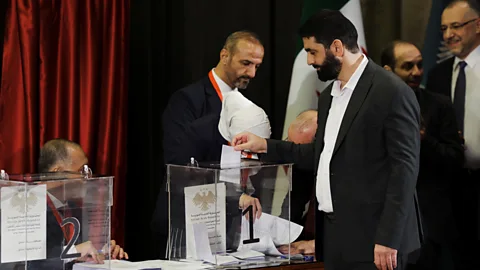Syria after Assad: How the first parliamentary elections could reshape the country’s political future

For the first time since the fall of Bashar al-Assad’s regime in December 2024, Syria has held parliamentary elections — a historic event and a symbolic step toward a new era of governance. The vote, organized under the transitional leadership of Ahmad al-Sharaa, has become a test of whether Syria can evolve from decades of authoritarian rule to a system reflecting pluralism and national reconciliation. Yet beneath the optimism lies a fragile foundation, reports G.Business.
A complex and controlled electoral process
Due to the absence of reliable census data and the displacement of millions, the elections followed an indirect system. Approximately 6,000 authorized delegates voted for 210 parliamentary seats. Two-thirds were filled through indirect voting, while the rest were appointed by President al-Sharaa. Authorities justified this approach as a safeguard against instability in provinces still affected by local conflicts. In three regions, elections were canceled entirely because armed factions prevented safe voting.
Transitional leadership and limited autonomy
The interim administration framed the vote as a bridge to a constitutional future. Al-Sharaa emphasized that the new parliament must lay the legal groundwork for state reconstruction and prepare for presidential elections in 2030. The assembly now represents all 14 provinces, but analysts warn that its independence remains constrained by executive influence. Behind official rhetoric of renewal, the political structure still reflects the caution of a leadership wary of losing control.
Democratic legitimacy under question
While international observers welcomed the elections as a symbolic milestone, they also noted the absence of true political competition. A third of the deputies were directly appointed by the president, and opposition parties were largely excluded. Without independent media, civic participation, or credible monitoring, the parliament risks becoming consultative rather than legislative. The exclusion of millions of Syrian refugees abroad — estimated at more than six million — further undermines the vote’s legitimacy.
Divided territories and fragile stability
Syria remains fragmented both politically and territorially. Kurdish-controlled areas in the north, the Druze-majority Suweida province, and several autonomous enclaves operate outside central government authority. Economic recovery is slow, sanctions persist, and armed clashes continue in parts of Idlib and Aleppo. For many Syrians, however, even a partially functional parliament represents the first tangible step toward stability after years of destruction. The sense of participation — however limited — carries profound symbolic meaning.
Can this parliament rebuild Syria’s future
The coming months will determine whether the new assembly can move beyond symbolism and shape the next chapter of Syria’s statehood. It faces the immense task of drafting a constitution that defines whether Syria becomes a federal, presidential, or parliamentary republic. The outcome will reveal whether the 2024 revolution truly ended authoritarianism or merely restructured it.
Despite deep uncertainty, one fact remains: for the first time in over two decades, Syrians experienced an election that, however imperfect, allowed them to feel the possibility of choice. Whether that fragile sense of agency can survive the political realities ahead will define Syria’s destiny in the years to come.
Stay connected for news that works — timely, factual, and free from opinion. Learn more about this topic and related developments here: Sarah Mullally becomes first woman to lead the Anglican Church
